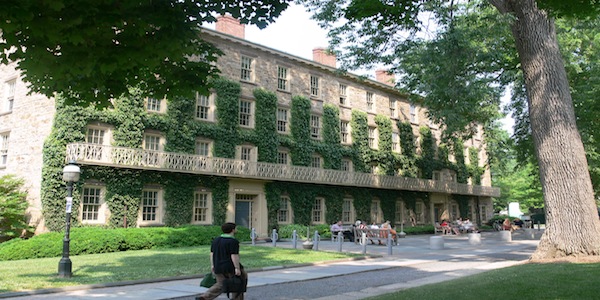College decisions season has arrived, and this year, one student took a very public approach to her bad news. She wrote a letter to the colleges that turned her down and submitted it for publication to the Wall Street Journal. Suzy Lee Weiss’ editorial letter satirically lambasts the college application process. She critiques its preference for applicants who are diverse, do-gooders, or who have helicopter parents that ensure their children submit perfectly well-rounded applications. It is easy to dismiss her manifesto as an immature, entitled rant, as many have done. But it does raises some larger points about the absurdity of the college admission process, and it forces us to ask whether we should be seeking education, and the privilege that accompanies it, in the first place.
Let’s back up for a second. Why, exactly, are top colleges so hard to get into? Demand is obviously an important factor. When only about 1 in 17 students receives admission to Harvard today (regular admit rate sits at ~6%), certainly there are many more qualified students than there are spots in the class. The factors Weiss cites are merely elaborate hoops students must jump through to distinguish themselves amongst a sea of highly-qualified peers, the conditioned products of a competitive environment. But is there more to story?
In another viral op-ed, Ross Douthat offers a more sinister explanation for this phenomenon. To Douthat, college admissions processes masquerade as a “holistic approach” to developing a diverse and well-rounded student body, but actually serve to “preserve privilege” within an elite class of people who “understand the system.” While today’s top colleges boast of diversity, Douthat insists that, “The result is an upper class that looks superficially like America, but mostly reproduces the previous generation’s elite.” To Douthat, the university serves as an elite microcosm offering a certain lifestyle and social status to its graduates, provided they play the game correctly. The cycle will only continue if these graduates marry, cluster in certain geographic enclaves, and have children who qualify to receive a similar education. The product is a protected upper class characterized by social, financial, and intellectual privilege. Whether or not this is a conscious effort is debateable, but according to Douthat, it’s rarely one that’s explicitly acknowledged. Rather, it’s a collective consciousness – “The actual practice of meritocracy mostly involves a strenuous quest to avoid any kind of downward mobility, for oneself or for one’s kids…something every upper-class American understands deep in his or her highly educated bones.”
The hold of this cycle is perhaps overstated, given that many students from outside this “elite” (though underrepresented) do attend top colleges, and some Ivy-League graduates put creative or just work above personal prosperity. Yet Weiss’ letter reminds us of the draw this kind of elitism has upon those both inside and outside of it. Getting rejected from colleges is loss of a certain status and lifestyle. In a land where the notion of the “American Dream” still inspires many to seek prosperity through hard work, the self-perpetuation of the elite appears as a kind of rights violation.
What is the answer to our absurdly competitive college admissions, to the extensive barriers-to-entry the admissions process sets up? Some might argue that admissions departments should reform their criteria, or that educational opportunities should be expanded. But, perhaps, we should do something more radical: reconsider whether this type of privilege is really what we should prioritize. In recent feature film Admission, Tina Fey plays Portia, a high-strung Princeton admissions officer who has spent the 16 years since she graduated from college assessing student applications. Her world is turned upside down when she encounters an unusual applicant—a brilliant student with terrible grades. She is led to believe that this student is actually her own son, who she gave up for adoption years earlier. Seized with maternal instincts, Portia goes to great lengths to overlook the young man’s resume inadequacies in an effort to help him gain admission to Princeton, where she believes he will thrive due to his pure love of learning. The movie descends into depths of absurdity as Portia loses everything she holds dear in an effort to overcome the system she has been entrenched in for almost two decades. In the end, she finds her greatest liberation in escaping the system and finding unexpected satisfaction in relationships outside of the elite bubble she has called home for years. The ultimate message is that higher education is well-suited for those with a passion and aptitude for learning, but that the greatest privilege of all is to love and be loved by others.
Clearly, this is a Hollywood example, but it does help to put things into perspective. Rejection from a certain institution will not lead to personal ruin unless we use absurd, historically unique criteria for what constitutes “ruin.” Life amongst “the elite,” moreover, can be lonely and stifling without quality relationships. But it is natural to try to hedge against failure by pursuing stability and status through personal achievement. It is this fear of failure that the church is uniquely suited to address. In affirming the dignity of all human beings, regardless of socioeconomic status, culture, and education level, Christianity undermines the idea that a person’s ultimate worth is tied to class. Instead, it frees individuals to follow their personal callings, deriving satisfaction from living as they were uniquely meant to, rather than according to a one-track societal definition of success. If a person’s calling involves higher education, so be it. But some of the greatest blessings— friendship, faith, and the dignity of work— can be enjoyed regardless of circumstance.
[Image of Ivy League College from Wikipedia]













